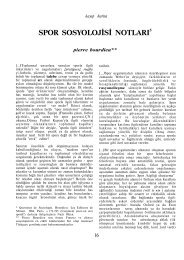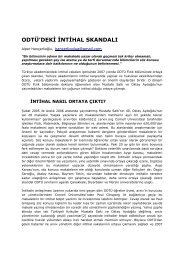Untitled
Untitled
Untitled
You also want an ePaper? Increase the reach of your titles
YUMPU automatically turns print PDFs into web optimized ePapers that Google loves.
Among neighbours<br />
'A uniform stratum of employees is in the process of formation. The<br />
grouping of the population according to class viewpoint has made big<br />
advances since the pre-war period.' What Emil Lederer and Jakob<br />
Marschak maintain in their excellent study 'The New Middle Class'<br />
( Grundriss der Sozialiikonomik, Section IX, Part 1), which in 1926 directed<br />
attention for the first time to the altered condition of salaried employees,<br />
Lederer himself has just recently had to quality anew. 'Even if the<br />
capitalist intermediate strata today already share the destiny of the<br />
proletariat', he writes in his study 'The Restructuring of the Proletariat'<br />
(included in the August 1929 issue of the Neue Rundschau) , 'the majority<br />
of them have nevertheless not yet abandoned their bourgeois ideology.'<br />
His judgement is shared by Richard Woldt, who in a treatise on German<br />
trade unions in the post-war period (incorporated in the collective work<br />
Strukturwandlungen der Deutschen VolkswirtschaJt ['Structural changes ill<br />
the German national economy']) characterizes as follows the attitlld('<br />
of the middle strata in decline: 'A certain professional ideology still<br />
stands in a relationship of tension with the actual facts. Large sectiolls<br />
of the population today do indeed base their bourgeois t'xistell(,(',<br />
which is no longer bourgeois at all, on monthly salarit'o 'ailed<br />
intellectual labour and a few other similarly trivial characterist.ic III<br />
total harmony with the experience articulated by Marx: that the<br />
superstructure adapts itself only slowly to the development of the base<br />
provoked by the forces of production. The position of these strata in<br />
the economic process has changed, their middle-class conception of life<br />
has remained. They nurture a false consciousness. They would like to<br />
defend differences, the acknowledgement of which obscures their<br />
situation; they devote themselves to an individualism that would be<br />
justified only if they could still shape their fate as individuals. Even<br />
where they struggle as wage-earners in and with the unions for better<br />
�onditions of existence, their real existence is often conditioned by the






